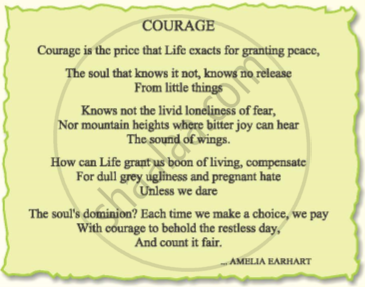Advertisements
Advertisements
प्रश्न
Can there be a good reason behind speaking when everybody else is silent?
उत्तर
Yes, sometimes people do not dare to raise Voice against the wrong happening. But a rebel cannot tolerate unfair things and raises voice against it. If nobody dares to speak, the once who do wrong are encouraged to do so ever again.
APPEARS IN
संबंधित प्रश्न
Answer these question in 30–40 words.
Where was the shehnai played traditionally? How did Bismillah Khan change this?
Match the meanings with the words/expressions in italic, and write the appropriate
meaning next to the sentence.
I knew a man was following me, I was scared out of my wits.
Match the meanings with the words/expressions in italic, and write the appropriate
meaning next to the sentence.
The boy hid behind the door, not moving a muscle.
Thinking about the Text
Answer these question.
What is Gerrard’s profession? Quote the parts of the play that support your answer.
How does Iswaran describe the uprooted tree on the highway? What effect does he want to create in his listeners?
The world's most famous female aviator, Amelia Earhart, disappeared in 1937, as she attempted to become the first woman to fly around the world with her navigator, Fred Noonan. She was last heard when she was around 100 miles from the tiny Pacific Howland Island on July 2, 1937.
Read the story of her 'Final Flight'.
On June 1, 1937 Amelia and her navigator Fred Noonan departed from Miami, Florida; bound for California. Their first destination was San Juan, Puerto Rico; from there, skirting the northeast edge of South America; and then on to Africa and the Red Sea.
The flight to Karachi was another first. No one had previously flown non-stop from the Red Sea to India before. From Karachi, the Electra flew to Calcutta on June 17 from there on, to Rangoon, Bangkok, Singapore and Bandoeng.
The monsoon prevented departure from Bandoeng for several days. Repairs were made on some of the 'long distance' instruments which had given trouble previously. During this time, Amelia became ill, and suffered from dysentery that lasted several days.
It was June 27 before Amelia and Noonan were able to leave Bandoeng for Port Darwin, Australia. At Darwin, the direction finder was repaired, and the parachutes were packed and shipped home as they would be of no value over the Pacific .
Amelia reached Lae in New Guinea on June 29. At this point they had flown 22,000 miles and there were 7,000 more to go over the Pacific. Amelia cabled her last commissioned article to the Herald Tribune. Photos show her looking very tired and ill during her time at Lac.
The U.S. Coast Guard cutter, Itasca had been standing off Howland Island for some day to act as a radio contact for Amelia Radio communications in the area were very poor as Itasca was overwhelmed with commercial radio traffic that the flight had generated .

Amelie left Lae at preciaely 00:00 hours Greenwich Mean Time on July 2 . It is believed that the Electra was loaded with 1,000 gallons of fuel , allowing for 20-21 hours of flying .
At 07:20 hours GMT Amelia provided a position report placing the Electra on course as some 20 miles southwest of the Nukumanu Islands . The last weather report Amelia was known to have received was before take-off . The head wind speed had increased by 10-12 mph, but it is not known if she ever received the report.
At 08:00 GMT Amelia made her last radio contact with Lae . she reported being on course for Howland Island at 12,000 feet . There is no real evidence as to the precise track of the aircraft after Nukumanu . No one saw or heard the plane fly over .
Several short transmissions were received by the Itasca with varying signal strengths but they were unable to get a fix on her location because they were too brief. At 19:30 GMT the following transmission was received from the Electra at maximum strength.
"KHAQQ calling Itasca. We must be on you but cannot see you ... gas is running low ... "
At 20: 14 GMT, the Itasca received the last voice transmission from Amelia giving positioning data. The Itasca continued to transmit on all frequencies until 21:30 hours GMT. They determined that Amelia must have died at sea and began to implement search procedures.
It has been determined that the plane went down some 35-100 miles off the coast of Howland Island. A life raft was stowed on board but no trace was ever found of the raft. Some experts felt that the empty fuel tanks could keep the plane afloat for a period of time.
President Roosevelt authorized a search party of 9 naval ships and 66 aircrafts at an estimated cost of over $4 million. On July 18, the search was abandoned by ships in the Howland area. George continued to seek help in the search, but by October he too abandoned all hope of finding them alive.
Amelia had been sending letters to George at stopovers all along her route quite regularly. These were published in the book 'Last Flight'. The book has a note from her to George ....
"Please know I am quite aware of the hazards ... I want to do it because I want to do it. Women must try to do things as men have tried. If they fail, their failure must be, but a challenge to others. "

Amelia created a number of aviation records :
o The first woman to fly across the Atlantic in 1928
o The second person to fly solo across the Atlantic in 1932
o The first person to fly solo from Hawaii to California in 1935 Guided by her publicist and husband, George Putnam, she made headlines in an era when aviation had gripped the public's imagination.
Subject Verb Agreement.
A verb must be in the same number and person as its subject e.g.
(a) A man and his wife have lived here since January 2009.
(b) Arun, a great scholar, is dead.
(c) Either James or Peter is to be promoted.
( d) The horse as well as its rider was hurt by the fall.
(e) Not only India, but also the whole world recognises Gandhiji's
achievements
(f) Eachman was rewarded.
(g) Every tree has been saved.
(h) The Adventures of Tom Jones is a great novel.
What does he plant who plants a tree? a
He plants a friend of sun and sky;b
He plants the flag of breezes free;
The shaft of beauty, towering high;
He plants a home to heaven anigh;
For song and mother-croon of bird
In hushed and happy twilight heard____
The treble of heaven's harmony_____
These things he plants who plants a tree.
Read the lines given above and answer the question that follow:
Explain with reference to context.
After washing from his hands and face the dust and soil of work, Joe left the kitchen, and went to the little bedroom. A pair of large bright eyes looked up at him from the snowy bed; looked at him tenderly, gratefully, pleadingly. How his heart swelled in his bosom! With what a quicker motion came the heart-beats! Joe sat down, and now, for the first time, examining the thin free carefully under the lamp light, saw that it was an attractive face, and full of a childish sweetness which suffering had not been able to obliterate.
“Your name is Maggie?” he said, as he sat down and took her soft little hand in his.
“Yes, sir.” Her voice struck a chord that quivered in a low strain of music.
“Have you been sick long?”
“Yes, sir.” What a sweet patience was in her tone!
“Has the doctor been to see you?”
“He used to come”
“But not lately?”
“No, sir.”
Read the extract given below and answer the questions that follow.
How did Maggie look at Joe when he entered her room?
She again rubbed a match on the wall, and the light shone round her; in the brightness stood her old grandmother, clear and shining, yet mild and loving in her appearance. “Grandmother,” cried the little one, “O take me with you; I know you will go away when the match burns out; you will vanish like the warm stove, the roast goose, and the large, glorious Christmas-tree.” And she made haste to light the whole bundle of matches, for she wished to keep her grandmother there. And the matches glowed with a light that was brighter than the noon-day, and her grandmother had never appeared so large or so beautiful. She took the little girl in her arms, and they both flew upwards in brightness and joy far above the earth, where there was neither cold nor hunger nor pain, for they were with God.
In the dawn of morning there lay the poor little one, with pale cheeks and smiling mouth, leaning against the wall; she had been frozen to death on the last evening of the year; and the New-year’s sun rose and shone upon a little corpse! The child still sat, in the stiffness of death, holding the matches in her hand, one bundle of which was burnt. “She tried to warm herself,” said some. No one imagined what beautiful things she had seen, nor into what glory she had entered with her grandmother, on New-year’s day.
Read the extract given below and answer the question that follow.
What did the girl say to her grandmother? Why?
Given below are four words and phrases. Find the words which have a similar meaning in the passage:
(1) Coming near
( 2 ) Disappeared suddenly
(3) Awakening from sleep
(4) Moved slowly and gradually
Which casket does Arragon finally choose? Whose portrait does he find inside? Which casket actually contains Portia's portrait?
“Have you children...” she began, and then, seeing they were curiously quiet, went on more slowly, “seen anyone lurking around the verandah?”
(i) What do you think Rukku Manni really wanted to ask?
(ii) Why did she change her question?
(iii) What did she think had happened?
Answer the following questions.
(i) If someone doesn’t wear a uniform to school, what do you think the teacher will say?
Describe Mr. Purcell’s daily routine at the shop.
What did the specialist prescribe in addition to medicine?
Read the newspaper report to find the following facts about Columbia’s ill-fated voyage.
Number of astronauts on board: ____________
Multiple Choice Question:
How is English a wonderful game?
Answer the following question.
What was the villagers’ reaction when the aunt explained her case to them?
Read the lines given below and answer the following question:
| “But my darling, if you love me,” thought Miss Meadows, “I don’t Mind how much it is. Love me as little as you like.” |
What was the effect of Basil’s letter on Miss Meadows?
